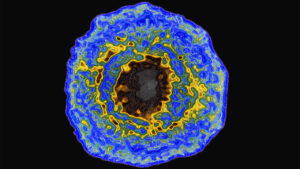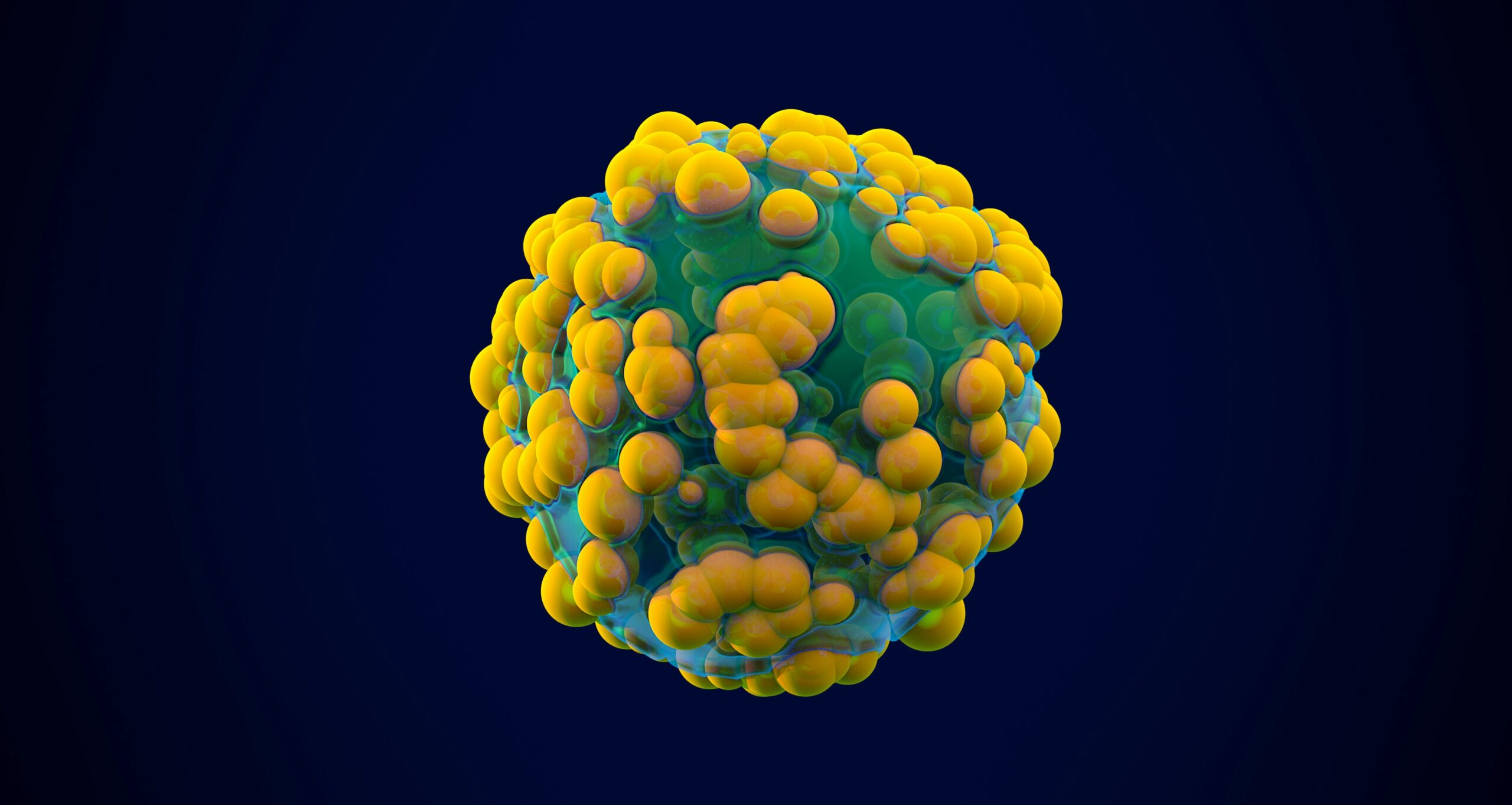How Can a Common Virus Like EBV Lead to Autoimmune Disease?
The Epstein-Barr virus may trigger autoimmune disease flares even if it’s dormant in the body and then disrupting the immune system when it reactivates years later. After initial infection (often unnoticed or presenting as mononucleosis) EBV takes up residence in B cells. It can remain latent for your entire life.
Over time, under certain conditions, this latent virus may reactivate. Doing so causes chronic immune stimulation. This reactivation can confuse the immune system, leading it to “attack the body’s own tissues”, which is the common way to describe autoimmunity in conventional medicine.
Because EBV can stick around within B cells and intermittently reactivate, it places chronic pressure on the immune system. This is not a new infection, but a reawakening of the original virus. That reactivation creates inflammation in the body that looks like or triggers autoimmune processes.
What Does the Research Say About EBV and Autoimmunity?
Recent studies have uncovered a significant link between EBV and autoimmune diseases, particularly through a viral protein called Epstein-Barr nuclear antigen 2 (EBNA2).
According to NIH-supported research, EBNA2 can bind directly to human DNA, particularly at genetic sites known to increase autoimmune disease risk.
Using an RELI algorithm, researchers found that EBNA2 influences transcription factor activity (gene expression-related proteins) at regions associated with lupus, multiple sclerosis (MS), and other autoimmune diseases.
In essence, EBNA2 can “flip the switch” on certain genes, changing how they work, and increasing the chance of autoimmune dysfunction.
Those studies support something surprising: EBV might not cause autoimmune diseases on its own, but it changes your genetic susceptibility, tipping the balance toward illness. In other words, EBV reactivation makes it more likely for people who are susceptible to autoimmune conditions to experience flare ups.
Proteins like EBNA2 do more than hijack the immune system. They change the rules of genetic expression within the body.
Which Autoimmune Conditions Are Most Strongly Linked to EBV?
Several autoimmune diseases show strong associations with EBV, including lupus, multiple sclerosis, rheumatoid arthritis, celiac disease, type 1 diabetes, juvenile idiopathic arthritis, and even IBD. EBV triggers each differently:
- Systemic lupus erythematosus (SLE): EBNA2 has been shown to bind to nearly half the gene regions associated with lupus risk.
- Multiple sclerosis (MS): Longitudinal studies suggest nearly all MS patients were previously infected with EBV. However, because up to 95% of adults around the world have been infected with EBV, this may be coincidental.
- Rheumatoid arthritis (RA): EBV DNA and antibodies are often elevated in RA patients.
- Celiac disease: EBV reactivation may contribute to intestinal inflammation in susceptible people.
- Type 1 diabetes: EBV may interfere with immune tolerance, leading to pancreatic beta-cell destruction.
- Juvenile idiopathic arthritis: Early EBV exposure may contribute to chronic inflammation.
- Inflammatory bowel disease (IBD): Chronic EBV may make gut inflammation worse and create an immune system imbalance.
All of these conditions share one thing: an overactive immune response that mistakes the body’s own tissues for invaders. EBV influences disease susceptibility. Genes interact with viral proteins.
What Makes Some People More Vulnerable to This Connection?
Not everyone who has EBV develops autoimmunity. Genetics play a major role. Certain HLA (human leukocyte antigen) gene variants increase autoimmune risk. When people with these genetic profiles encounter EBV, especially when the immune system is already stressed, the risk of autoimmune disease rises.
Other contributing factors include:
- Chronic stress: High cortisol levels suppress immune surveillance and encourage viral reactivation.
- Sleep deprivation: Poor sleep reduces immune regulation and raises inflammation.
- Toxic burden: Exposure to heavy metals, mold, and chemicals can weaken your immune system.
- Hormonal changes: Perimenopause, thyroid dysfunction, and adrenal imbalance all affect your immune resilience.
In short, genes can make you more vulnerable, but environment and lifestyle (particularly stress, which lowers your immune system’s surveillance abilities) put things in action. EBV plays a role in this complex interaction.
Can You Have Autoimmunity Without Symptoms from EBV?
Yes, you can have autoimmunity without EBV symptoms. Subclinical EBV reactivation, meaning the virus becomes active without causing obvious symptoms, is surprisingly common in people with autoimmune conditions. Many patients don’t remember having mononucleosis but show high levels of EBV antibodies or viral DNA.
This silent reactivation can add to the body’s overall immune burden. It may not mean having a fever or sore throat, but it keeps your immune system in a low-grade state of alert, and that wears down defenses and encourages autoimmune flares. Because the symptoms are subtle (fatigue, brain fog, joint pain), many doctors overlook the viral connection.

How Do Naturopathic and Functional Medicine Practitioners Address the EBV–Autoimmune Link?
Unlike conventional medicine, which often treats symptoms alone and not in conjunction with other things, naturopathic and functional medicine look for root causes. Their goal is to treat the entire landscape, not just the symptoms.
When it comes to EBV and autoimmunity, practitioners focus on underlying drivers like:
- Immune dysregulation
- Chronic infections
Chronic viral load
- Gut dysfunction and permeability
- Toxic exposures (mold, metals, pesticides)
- Hormonal and mitochondrial imbalances
In NYC, where environmental stressors and urban toxins are common, functional medicine doctors and naturopaths may run comprehensive lab panels. These include EBV antibody testing (VCA IgM, IgG, EBNA, EA), inflammatory markers, HPA axis assessments, and genetic testing.
Personalized protocols can:
- Rebuild immune tolerance
- Reduce inflammation
- Support mitochondrial function
- Encourage viral suppression
Practitioners may also work with nutrition, adaptogenic herbs, probiotics, detox support, and stress-reducing practices like breathwork and vagus nerve stimulation. These help reduce chronic stress, improve gut health, and limit inflammation throughout the body.
Can Epstein-Barr Be Prevented from Triggering Autoimmunity?
You can’t always prevent EBV exposure. Most people contract it by adulthood, even if they don’t experience symptoms. You can however reduce your risk of reactivation and autoimmune flare-ups.
Some of the most effective prevention strategies include:
- Nutrient sufficiency: Make sure you’re getting enough zinc, selenium, vitamin D, B12, and omega-3s. Eating a widely diverse diet, rich in vitamins and minerals.
- Adaptogenic herbs: Ashwagandha, rhodiola, and holy basil help regulate the body’s stress response. These herbs help your body adapt to stress. If your cortisol is elevated, they can bring those levels down and if cortisol is too low, they can bring those levels up.
- Detox support: Bitters, binders, and sauna therapy can help in clearing toxins from your organs and tissues.
- Gut healing: Probiotics, prebiotics, and a clean diet rich in fiber can reduce immune activation and inflammation.
- Hormone balance: You need to address adrenal and thyroid function to support your immune system’s function.
Reducing your exposure to known environmental triggers, like mold, heavy metals, and co-infections like Lyme or HHV-6, can also protect against viral reactivation.
Lifestyle plays a major role, too. Overtraining, under-sleeping, and chronic emotional dysregulation all leave the door open for EBV to reactivate.
Final Thoughts: Understanding the EBV–Autoimmunity Link
While there’s still work that needs to be done, the connection between Epstein-Barr virus and autoimmune disease is becoming clearer, thanks to research into gene expression, viral proteins, and immune dysfunction. EBV doesn’t act alone, but its ability to manipulate host DNA and provoke chronic inflammation makes it a major contributor in genetically susceptible individuals.
Rather than fear EBV, it’s better to understand its role and what you can do to fight back. Functional and naturopathic medicine offer proactive tools to detect reactivation, manage immune burden, and strengthen your body’s resilience.
Awareness drives prevention. With early intervention, personalized care, and lifestyle support, you can keep EBV dormant and reduce your risk of autoimmune disease.









